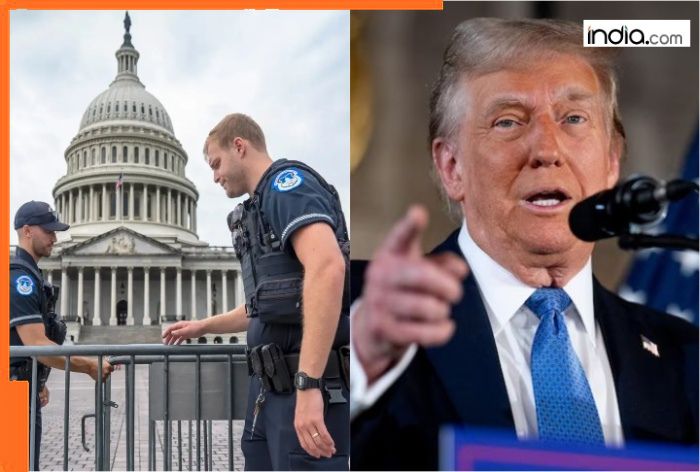US government shutdown: What is filibuster and why Trump called for ‘nuclear option’ against it?
Donald Trump, after returning from his Asia trip, questions why "powerful Republicans" allowed the Democrats to shutdown the US government, and called for the "nuclear option" to get rid of the filibuster rule in the US Senate to end the US government shutdown.

US government shutdown: US President Doland Trump has urged Republican Senators to get rid of the filibuster in the US Senate by invoking the “nuclear option” as the US government shutdown crossed the 30-day mark on Thursday.
Trump calls for ‘nuclear option’ against filibuster rule
In a post on his Truth Social network, Trump, after returning from his Asia trip, questions why “powerful Republicans” allowed the Democrats to shutdown the US government, and called for the “nuclear option” to get rid of the filibuster rule in the US Senate, which he argued will allow Republicans to end the shutdown and pass legislation with a simple majority.
“It is now time for the Republicans to play their “TRUMP CARD,” and go for what is called the Nuclear Option — Get rid of the Filibuster, and get rid of it, NOW!,” Trump wrote.
“Just a short while ago, the Democrats, while in power, fought for three years to do this, but were unable to pull it off because of Senators Joe Manchin of West Virginia and Kyrsten Sinema of Arizona. Never have the Democrats fought so hard to do something because they knew the tremendous strength that terminating the Filibuster would give them,” the US president added.
What is the filibuster?
The filibuster is a unique tactic employed by US Senators to block passage of bills in the US Senate by conducting long debates with speeches that can last for 24 hours in some cases, delaying legislations even when in minority, as the debates can be extended indefinitely.
Under the practice, one of more senators are deployed to delay or block a vote on legislation or nominations by indefinitely extending debates as Senate rules do not impose any restrictions on speeches.
Critics of the practice call it a loophole often exploited by opponents to create deadlocks in the House and prevent passage of legislations, as filibusters can be theoretically extended indefinitely until 60 senators vote to end the debate and allow voting on a bill. However, proponents argue that filibuster is a means to protect minority rights and promotes compromise, as it allows blocking passage of controversial legislation.
Notably, filibusters are rarely used in practice as the mere threat of an indefinite debate is usually enough to halt Senate business. Historically, continuous speaking on the House floor, known as “talking filibusters”, have been used to civil rights legislation, and in recent decades, as a tool by both parties to block passage of major bills in the US Senate.
Why Trump wants to scrap filibuster?
The filibuster, a Senate rule that typically requires 60 votes to advance legislation, has long been a point of contention in Washington. Doland Trump pointed out that several Democratic senators, including those under then-President Joe Biden, had previously called for changes to the rule to safeguard voting rights and abortion access. However, those proposals failed to secure full support within the party.
Trump further contended that Democrats would not hesitate to scrap the filibuster if given the chance to pursue their own legislative priorities, such as granting statehood to Puerto Rico and Washington, D.C.
“Well, now WE are in power, and if we did what we should be doing, it would IMMEDIATELY end this ridiculous, Country destroying ‘SHUT DOWN,'” Trump wrote. “If the Democrats ever came back into power, which would be made easier for them if the Republicans are not using the Great Strength and Policies made available to us by ending the Filibuster, the Democrats will exercise their rights, and it will be done in the first day they take office, regardless of whether or not we do it.”
Trump’s remarks come as the shutdown continues to strain federal operations and public services, with growing calls from both parties for a legislative breakthrough.
How filibuster enables Democrats to block legislation?
Under the Senate filibuster rule, the Democrats, who are in minority in US Senate, hold significant influence in blocking bills, effectively limiting the majority’s ability to pass its agenda, and while past reforms have reduced the threshold for confirming judges and nominees to a simple majority, broader legislative changes still require 60 votes, according to The Hill.
With Senate Republicans holding 53 seats, it remains uncertain whether they have enough backing within their ranks to abolish the filibuster entirely, however, in recent days, some GOP lawmakers have increasingly discussed potential rule changes if Democrats do not agree to end the shutdown. However, Senate Majority Leader John Thune (R-S.D.) has publicly stated that he opposes weakening the filibuster, The Hill reported.
Even Republicans who have previously supported preserving the filibuster have suggested the possibility of introducing a limited exemption to the 60-vote threshold, specifically to facilitate reopening the government, the report said.
(With inputs from agencies)
What's Your Reaction?




















































